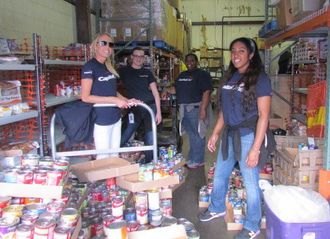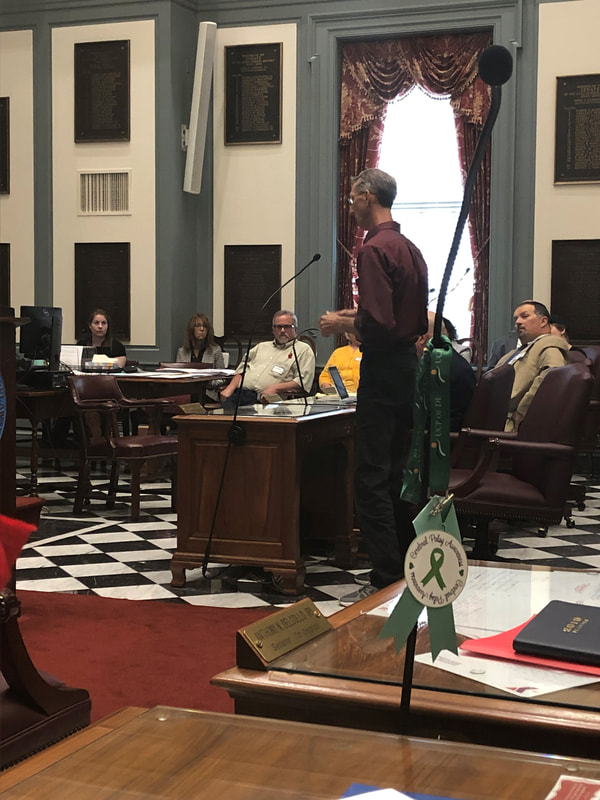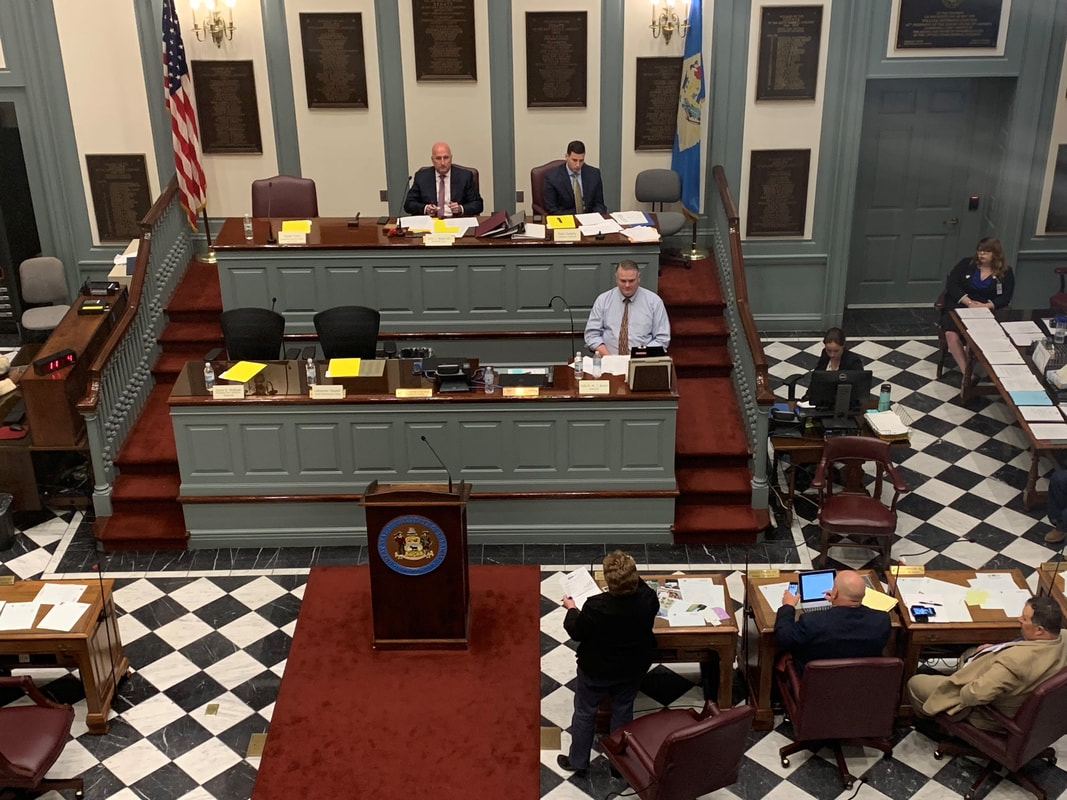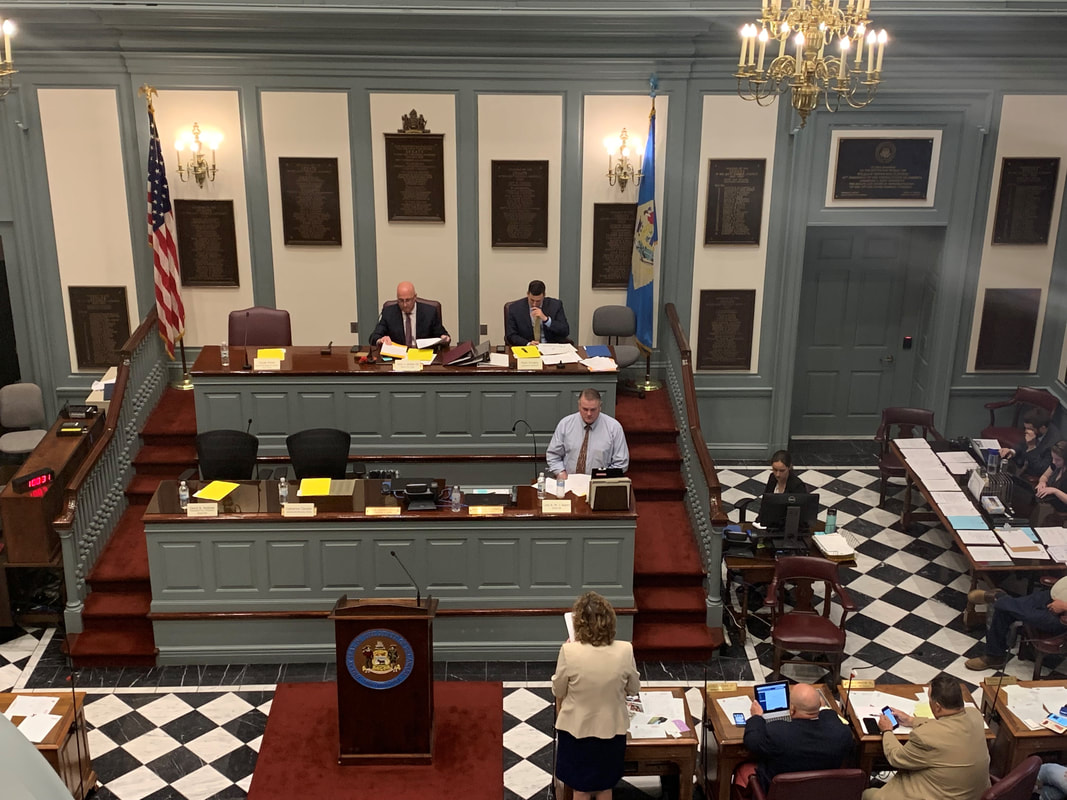|
by James DeChene This week in Dover the major bill impacting the business community was SB105, which will raise Delaware’s minimum wage to $15. We started off the week hosting a teletown hall with over 50 members joining to hear the latest on timing and strategies, and a number of businesses joined us in Dover to make comment on the bill at the Senate Labor Committee. The stories business leaders shared during the committee meeting were compelling and varied, and included entities ranging from nonprofits to small and medium sized businesses from bakeries to a small business sign maker. Ultimately the bill was released from committee and has now been assigned to Senate Finance Committee due the bill’s significant fiscal note. If you have not taken the opportunity to contact your senator on this bill, I urge you to do so by visiting our Action Network page. Other bills of note: The passage of a Chamber-backed bill in SB61, which would create a Transportation Infrastructure Investment Fund (TIFF) to help expedite commercial and industrial development projects. Released out of committee was SB74. This bill would make a technical change to the New Economy Jobs credit making it easier and more likely businesses will be able to take advantage of the credit. Moving forward, there are 7(!) legislative days left this session. DEFAC will meet next Wednesday to announce the final forecast numbers that will dictate how much money will be allocated to the bond and grant-in-aid bills. members testifying against sb105 on june 12:
0 Comments
In a surprise announcement at the 20th Annual Marvin S. Gilman Superstars in Business Awards Luncheon, the Delaware State Chamber of Commerce awarded the esteemed Gilman Bowl to its namesake’s daughter Martha Gilman. The award, presented in conjunction with the Chamber’s Small Business Alliance, is kept secret until the event.
Martha has played a critical role in the activities of the Small Business Alliance, being a long-standing member of the Board of the Alliance and as a member of the State Chamber Board of Directors for over a decade. Since its inception in 1998, Martha has relentlessly committed to making the annual Superstars Luncheon a moral and financial success. Her tireless efforts in logistical planning and development/fundraising for the annual event continues year after year and is a testament to her parents’ admired example. “One of the things I love most about this program and hold with me each year is the memory of seeing my mother’s pride when she would attend the luncheons. The Hotel du Pont was one of my father’s favorite Delaware landmarks, and so it is very special to our family to hold the awards luncheon in the Gold Ballroom. I’m honored to carry on their good work in this way, and even more so to bring my son, Brett, in as part of their legacy,” said Martha in a recent interview for the Chamber’s magazine, Delaware Business. She and her father went into business together, founding Gilman Development Company, a land development and homebuilding firm. Additionally, she co-founded Cornell Management along with her father and brother, Peter. Cornell Management, in conjunction with Gilman Development, builds, owns and manages rental housing. Martha and Marvin were also instrumental in creating The Delaware Housing Partnership (DHP), which provides families with affordable and comfortable housing as homeowners or as renters. The Gilman family’s efforts have given approximately five hundred families in all three counties the ability to lead a better quality of life with homes in which to raise their families. Leading the charge on Gilman Bowl nominations each year, it was a big but important task to make sure she would be surprised. A fake script was even crafted to keep her in the dark. It wasn't until a video she thought was about the 20th anniversary played that it became clear, with her son, Brett, and several colleagues making the announcement. Click here to watch the announcement; and click here to watch the Facebook Live video from the event. DSCC President Mike Quaranta was joined by Senator Chris Coons, along with Martha's family, to present the award. The Gilman Bowl was established to recognize those who exhibit exceptional small business leadership. It is named in memory of Marvin S. Gilman, who served as an exemplary leader and a paragon of small business and philanthropy in Delaware. Martha has, and continues to, serve her community in various ways. Her involvement includes the 21st Century Childrens’ Fund, a nonprofit that gives grants to children in need so that they can participate in extracurricular and developmental activities that would otherwise have been beyond their financial reach; as well as the Delaware Community Fund, the Rotary Club of Wilmington and the Homebuilders Association of Delaware. The program included keynote remarks from Scott Kammerer of SoDel Concepts. "Building something from nothing isn't for everyone, but I wouldn't trade it for anything," said Kammerer in sharing the story behind SoDel's inception, challenges overcome, accomplishments made and the success yet to be had. The event also honored eight outstanding companies as Superstars in Business and Award of Excellence winners. Winner videos and event information can be found at www.dscc.com/superstarsinbusiness. by James DeChene
The Delaware House of Representatives held a late night, with a 3:30 a.m. vote to increase Delaware’s minimum wage by $.50 twice next year, in January and October 2019. House Republicans were able to negotiate the passage of a bill that would create two lower-wage groups—a training wage, and a teen wage, to be paid at most $.50 under the minimum wage once the bill goes into effect on January 1, 2019. The Delaware State Chamber, along with other business groups, were on hand throughout the last night of session to provide input and feedback on how this legislation was being crafted and handled. Each year legislation has been introduced to raise the minimum wage, which was last raised in 2015. Each year the legislation is sent to the Senate Labor Committee (as it generally originates in the Senate), where it passes, and goes to the full Senate for a vote. This year, the first minimum wage bill, SB110, followed that process. At a hearing lasting two hours and full of testimony from nonprofits, the agriculture community, and members of chambers from around the state, all offered testimony on the negative impact increasing the minimum wage would have on their businesses and their employees. Ultimately SB110 would fail in the Senate when it came up for a floor vote. Fast forward to later in the year when SB170 was introduced, another bill by the same sponsor, Sen. Marshall, that would raise the minimum wage. The bill was heard, and released, from the Senate Labor Committee. On July 30, SB170 passed the Senate as part of a negotiated deal to provide relief for Delaware casinos, and headed over to the House and was assigned to the House Economic Development Committee. In years past (at least since 2014), when a minimum wage bill passed the Senate, and headed to the House, the bill was heard, and failed in committee. The same process of having impacted businesses, nonprofits and farms share their stories followed, and ultimately, members of that committee would vote to defeat the bill. Last night, in a dramatic departure from the usual process, members of the House voted to bring SB170 to the floor for action under a suspension of the rules, a process normally reserved for non-controversial bills. As evidenced this year, with other legislation in the Senate, departure from that process seems to be increasing in its frequency, a trend we hope does not become the norm. What is most disturbing about what happened on July 1, is that members of the general public, both opponents and supporters of a minimum wage increase, were unable to have their voices heard. Thankfully, a second bill was negotiated to provide alternative wages for training and for teens, but that shouldn’t have been undertaken in the wee hours of the morning. The Delaware State Chamber, along with the New Castle County Chamber, the Central Delaware Chamber, the Delaware Restaurant Association, the Delaware Food Industry Council, the Delaware Chain Drug Association, the National Federation of Independent Business, and other business groups have all worked together over the years, including this year, to let legislators know the negative impacts of raising the minimum wage, and the numerous studies showing how it negatively impacts the employees they are trying to help. The Chamber remains disappointed in the passage of SB170 and will continue with others in the business community to maintain the message that these types of bills hurt business and they hurt workers. Legislators will continue to be told that businesses will have to decide how to cut additional costs to pay for this added payroll expense. It is imperative that people working full time for minimum wage are encouraged to add to their education and outfit themselves with skills that meet workforce needs in order to improve their personal or family situation. For more information regarding Chamber advocacy efforts, please contact me at [email protected]. by James DeChene
Last week Governor Carney and Treasurer Simpler released a bipartisan plan to help address Delaware’s economic boom and bust cycles. Last year’s $400 million budget shortfall highlighted the volatility in our state’s revenues, and this year’s $400 million increase in revenues, while a boon, is an $800 million swing in just one year. For a state with a $4 billion budget, that kind of shift is incredibly significant. Enter in the budget smoothing idea. Making changes to smooth out these peaks and valleys in our revenue stream has been a Chamber priority since 2015 when DEFAC released its revenue report. This report highlighted how volatile Delaware’s revenues are and provided a blueprint on how to prepare Delaware for the future, putting it on a path toward sustainability. The state has undertaken some of that blueprint by making changes to Delaware’s escheat program and by changing how companies calculate their corporate income tax to a single sales factor. The next part of the process needs to happen now! A constitutional amendment, the first leg of which needs to be passed this year, would help create a true rainy day fund to be used in times of need, and added to in good times. In fact, the Joint Finance Committee itself voted this week to defer $46 million of this year’s revenue to future spending—exactly the way the budget smoothing process would be utilized. The benefits to budget smoothing are good for businesses, who won’t be subject to knee jerk reactions to raise money fast to balance a budget through tax and fee increases. It also helps Delaware’s nonprofits who receive Grant-in-Aid funding better plan year to year instead of facing last minute cuts in the down years and hoping for their replacement in the up years. With revenues projected to be close to $500 million this year above last year’s budget, the time is ripe to make improvements to Delaware’s future. There’s no negative impact to funding, or to this year’s budget, and the case is strong to act now to plan for an uncertain future. by James DeChene
In case you missed it, the News Journal, WDDE, and DE State News all had articles on a proposal by Governor Carney and Treasurer Simpler to create a budget smoothing process. Efforts would help avoid budget boom and bust cycles like last year where nonprofits and other agencies saw funding cuts. It helps the business community by providing certainty and avoiding knee jerk funding needs resulting in higher taxes and fees. Here is a roundup of recent coverage on this issue: Remarks by Paul Herdman, President & CEO, Rodel Foundation of Delaware
Good evening everyone. My name is Paul Herdman and I’m the president and CEO of the Rodel Foundation of Delaware. I also serve on the board of directors for The Partnership. I’m up here tonight to present the John H. Taylor, Jr. Education Leadership Award—named after someone who I knew and respected ever since I came to Delaware—to another longtime friend and mentor, John Hollis. John Taylor’s wife, Maria, and his son, John, are here with us today and helped us make this choice in partnership with the leadership of the Chamber and the Partnership, Inc board. In making this decision, we thought hard about the core attributes that John Taylor brought to his work. Two that stand out to me are, one, a deep and unwavering passion for kids, particularly those most in need, and two, integrity and universal respect from those on the front lines to the leaders of business and government. As our group began reviewing the amazing candidates for this award, John Hollis fit these attributes to a tee. For those of you in the audience who aren’t familiar with John Hollis’ body of work... In 1974, John was approached by some leaders at the Seaford Dupont nylon plant, which was the world’s first and largest (at the time) nylon plant. The bigwigs at Dupont wanted to tap into a national movement called the National Action Council for Minorities in Engineering group, and the folks at the Seaford plant wanted to participate. John at the time was coaching and teaching science for the sons and daughters of the Dupont engineers, who all thought they needed an educator to advise and motivate these students. So from relatively humble beginnings, MERIT was born, essentially as a science club aimed at local African American, Native American, and Latino children. MERIT stood for Minority Educational Regional Incentive Training. Their charge was clear: to help address the wide disparity between a roughly 25-percent local minority population, and the less than 1 percent of whom were matriculating into higher education in science and technical fields. Now, John knew from his years as a coach, counselor, and teacher that if we wanted to inspire these children to higher education and beyond, he needed to develop the whole child, not just host them in a science club. So John got to work utilizing his knowledge in motivational science to morph this science club into a total youth development program, helping countless young people with not only academic chops, but with motivation, goal-setting, time management, and more. John understood that all students have the potential for greatness. And that sometimes, what they needed most was a picture of what that greatness could look like. Hence the importance of setting goals, and understanding the steps needed to reach those goals. He did all this with an unflinching approach to STEM education (back before STEM was the buzzword it is now). MERIT kids were engaging in rigorous instruction met with fun activities that made science and engineering come alive. Stuff like engineering competitions with fighting robots or wind turbine design contests—often in partnerships with local employers. John once told us that he thinks about MERIT as a place where the rubber meets the road. In other words, he doesn’t operate in theoreticals, but in action. He preaches family involvement, community activation, mentorship. Not that he needs validation, but MERIT’s track record does just that. To date, 370 MERIT alumni have gone on to achieve a college degree, accounting for approximately 97% of its participants. Many return to volunteer, creating a strong alumni base, which has helped shape the evolution of the program. 14 MERIT students have gone onto Ivy League degrees. Around 30 have doctorates. In addition to all his work with MERIT, John’s been deeply involved with DelTech, the Delaware Community Foundation, the Western Sussex Boys and Girls Club, and Nemours. John has overseen MERIT for 42 years. And he’s done so through a lens of servant leadership and I know his faith has been foundational to how he approaches the work. Thanks to his guidance, hundreds of young people who needed a leg up have been inspired by his passion for engineering and math, and more. He has given his heart to the community and never asked for acknowledgement. I have every confidence that the namesake of this award, John H. Taylor, would have been honored to give him some of that recognition. Ladies and gentlemen, it’s my honor to present the John H. Taylor, Jr. Education Leadership Award—to John Hollis! by Mark DiMaio
Last year we asked Chamber members to participate in a survey for input about obstacles to their business growth. We received nearly 100 individual responses to our question about specific suggestions on what Delaware should do to improve its economy. Listed below are four areas that respondents mentioned most often, along with ways the Chamber is working to advance Delaware’s economic health. Improve schools and infrastructure
Balance the state budget with new revenue sources and cut government spending
Encourage entrepreneurship and a diverse economy - strong business climate to attract new business
Streamline land use and permitting process – less regulation overall
by Mark DiMaio
In 2017, we invited Chamber members to participate in a survey to gauge their view of Delaware's economic health, and provide input on policy priorities. Listed below are the top four, along with ways the Chamber is addressing them. 1. Economic Development The Chamber is dedicated to promoting an economic climate that strengthens the competitiveness of Delaware businesses and benefits citizens of the state.
2. Cost of Health Care The Chamber recognizes the growing problem surrounding health care costs.
3. Government Spending We will continue to advocate for structural changes to Delaware’s budget. Delaware needs fiscal policies that foster business growth and advance the state’s long-term economic future.
4. Education Reform (K-12) Improving education outcomes is a key factor in developing a skilled workforce and attracting new business to Delaware.
Maybe it’s a continuation of my turkey coma, but I saw a lot of positive things happening this week in and around Delaware you may have missed. Chamber member, and Taste of Delaware participant, Waggies by Maggie & Friends, a Wilmington nonprofit dog treat company that employs people with intellectual disabilities, has won the $10,000 grand prize in M&T Bank’s first Understanding What’s Important Business Challenge. Maggie’s has been a great friend of the Chamber, and everyone here is so pleased at their award. Congrats!
The announcement of a sports arena to be built by the Riverfront, with a connecting bridge to area attractions like Iron Hill and Frawley Stadium, is huge for Wilmington. Above and beyond what it can bring for economic development, it’s a major quality of life project for an area of the City that desperately needs one. Kudos to Governor Carney, Mayor Purzycki, and BPG for working together to bring this project to Delaware. Speaking of Governor Carney, you may have read about the release, a bit early, of his Wilmington schools plan. While the plan will undergo a number of changes, what struck me was the Governor taking the time to visit residents of Wilmington in person, urging them to participate in the process and to educate them about what his plan will mean for Wilmington kids and families. Door knocking can be hard, and at times even unpleasant, but it’s also one of the best ways to sell your message. Color me impressed. Lest you think I’ve lost my Grinch-esque ways, let me end by saying we’re following chatter that there’s an effort afoot to build support in order to increase Delaware’s Renewable Portfolio Standard to 50%, with an 8% carve out for solar generation. Currently, Delaware’s Renewable Portfolio Standards (RPS) are established by the Renewable Energy Portfolio Standards Act (REPSA), which provides that utilities procure an increasing percentage of their electricity from renewable resources, leading up to 25% of energy derived from renewable sources by 2025. Obviously we’ll be watching this closely.  With the upcoming holiday season, Sunday Breakfast Mission is hosting their annual food drive, which runs until the end of the year. They provide food to homeless men, women and children, as well impoverished individuals and families who do not have a secure source of food. Sunday Breakfast Mission has been providing for the homeless, hungry, and hurting in New Castle County for 125 years. The foundation seeks to treat those who are in the most need with dignity. The goal of the annual food drive is to collect enough food items to provide the community with 120,000 meals. A portion of those meals will be distributed to 1,500 families the week of Thanksgiving and 1,000 individuals will receive Thanksgiving dinner on Thanksgiving Day. The remainder of the food is utilized in providing nightly community meals, and in assembling food boxes to those in need during the year. Anyone who would like to participate in the food drive is welcome to donate items such as boxed stuffing mix, pasta, and canned vegetables or soups. See below for a full list of possible donations. Just one standard grocery bag of food provides the foundation with enough to give 10 to 15 meals to a family facing food insecurity. Food can be taken to any WSFS branch location in Delaware, as well the Sunday Breakfast Mission located at 110 N Poplar Street, Wilmington, DE 19801. Additional information about the food drive can be found here, and financial donations are welcome here. Donation Ideas:
|
Archives
July 2024
Categories
All
|
|
Copyright Delaware State Chamber of Commerce, Inc.
All Rights Reserved. PO Box 671 | Wilmington DE 19899 (302) 655-7221 | [email protected] | sitemap |
|





 RSS Feed
RSS Feed